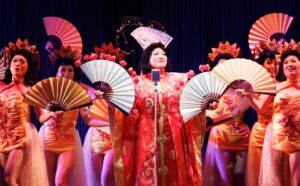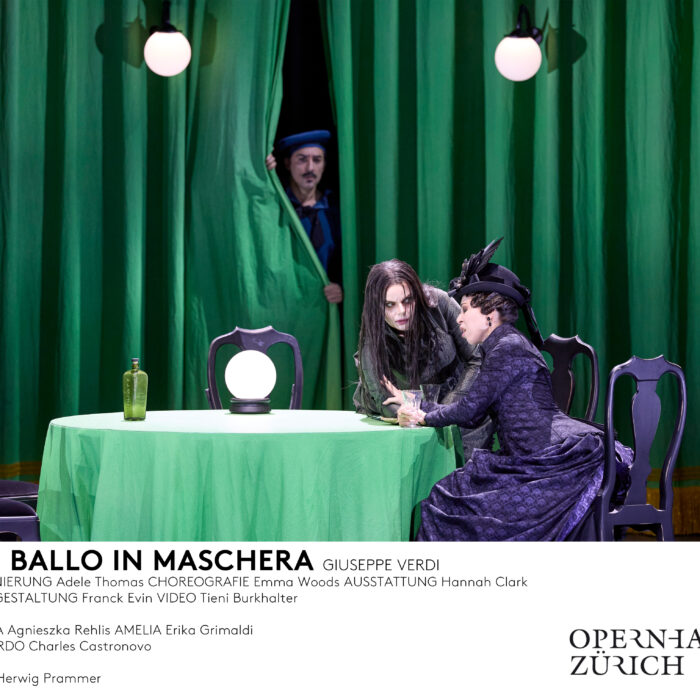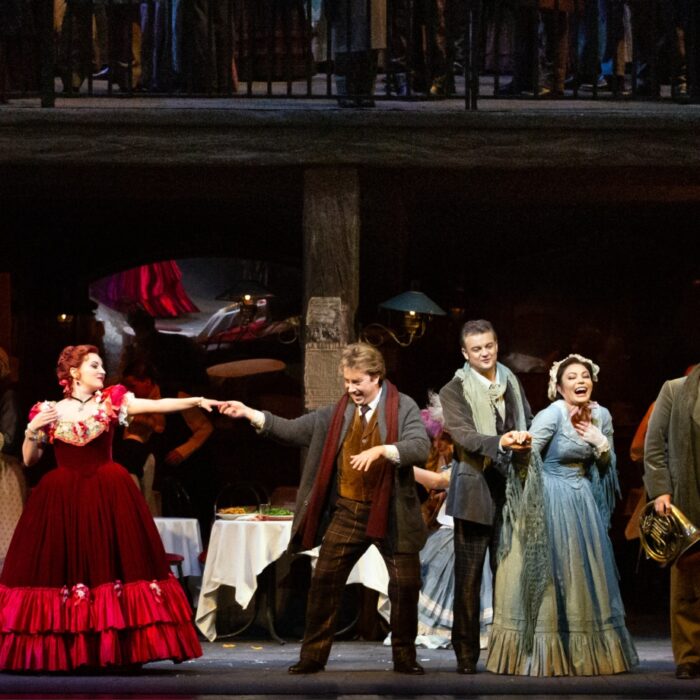
Boston Lyric Opera 2023 Review: Madama Butterly
By João Marcos Copertino(Photo credit: Ken Yotsukura)
Boston Lyric Opera (BLO) has decided the need to move Puccini’s “Madama Butterfly” away from racism in order to save Puccini from himself. In doing so, BLO’s main production asset is its vocal cast composed mostly of people of Asian descent—an asset that BLO has been very eager to publicize.
However, this narrows interpretations of what the story behind “Butterfly” can mean. While the operatic experience comprises multiple factors including voice, feelings, mood, and personal histories, one might argue that Puccini, Illica, and Giacosa were way more concerned about debating the place of modernity and Italian culture. Therefore, BLO’s production makes “Butterfly” only about one thing: the Asian-American journey during the war years.
By making “Butterfly” about something—and only that one thing—, BLO seeks to avoid alienating audiences that otherwise might be offended by the original plot and instead, invites a more inclusive audience to the opera. This well-intended dream has the underlying assumption that going to the opera should not involve being “triggered.” Therefore, “Butterfly” becomes less a matter of artistic coherence and more about moralizing representation.
San Francisco in the 1940s
The stage direction of Phil Chan transposes action from Nagasaki to San Francisco between 1941 and 1942 (with some allusions to 1983), recasting the drama as a story of Asian-Americans and trying to make it in the city while enduring the internment camps during the war. In doing so, Chan transforms “Butterfly’s” original anti-U.S. Imperialism plot to an inner criticism of the US treatment of non-white populations that are as American as everyone else.
The first act is a glimpse into the lives of not only Japanese immigrant communities, but of East Asian groups in general thriving in Frisco. The second and third acts take place in the internment camp itself, making Butterfly a prisoner, and not a delusional girl waiting for her “husband.” Her doomed hopes are not about Pinkerton, but instead about an “American Dream” from which she is, unknowingly, excluded.
To sustain this level of bold artistic liberty, Chan spares no efforts in altering the text and lines within “Butterfly.” For example, there is no reference to Nagasaki at all. Since the action happens during World War Two, referring to Nagasaki would be too problematic. Therefore, we clumsily hear the singers saying “San Francisco” instead. More dramatic changes include Goro, rather than Pinkerton, expelling Bonzo from his bar; making Suzuki a Christian who prays to the almighty Lord; and having the same loyal figure mock Butterfly and her delusions prior to “Un bel di vedremo.” The subtitles were also far from faithful translations of the Italian text. They invent a lot—and this is okay, especially because the cast’s Italian is mostly pretty good.
Although all of these textual and musical alterations might produce estrangement, and a sense of audible prosodic clumsiness, for a connoisseur of the score, they were not incoherent given the production’s main goals. In fact, if anything, the stage action was extremely clear—to a pedagogical degree.
A Share of Issues
Despite competent story-telling, and an original take on “Butterfly,” the production has more than its share of problems. Whereas Puccini’s music, along with Illica and Giacosa’s text, relies on an idealism and lyrical purity for their beauty, BLO gives us a drama that, while animated by a sense of urgency is nevertheless devoid of any aestheticism and refinement. More than an austerity in the scenarios and lighting—and even in the movements on stage—there is a sense of transmitting a message that often hides the beauty of the medium, i.e. opera itself.
One issue is the construction of some sentences are in the playbill. For example, in the Director’s Note, Chan writes “How do we continue to produce to present this tragedy that happens at the expense of an Asian woman […]?” If we cross out “Asian,” we are basically calling out the entire operatic repertoire, in which nearly every operatic tragedy happens “at the expense” of one woman or another (as Catherine Clément pointed out in her “Opera or the Undoing of Women”). Moreover, Spoiler Alert: In Chan’s production, Cio-Cio-San does not die, but her son does after he gets sick in the intermittent camp. Some sacrifice has to occur in order for the opera to happen and this production just has the mixed-race child die in place of his mother. End of Spoiler.
The interesting aspect is that if there is such a group of performers and creators that was prompted to make “Butterfly” a story of their own, it means that Puccini, Ilica, and Giacosa’s work had something in it that had already engaged them to see themselves in the work from the start. Maybe “Butterfly” could be appropriated by a community as much as “Porgy and Bess” and “West Side Story.” These are not without problems and tensions, but still, ubiquitously present in everyone’s mind. Some claim that it is better to get rid of them altogether. While others truly think that despite all odds, they are pretty great.
Strong Musical Presence
The musical performances were strong and very in tune with the stage action, but not flawless. Everyone in the cast had very good Italian, correctly cast voices, and charisma.
David Angus has an efficient reading of Puccini’s score and does not cover the singers with an overwhelming orchestral sound. However, his reading is as lyrically dry as the staging. It does not help that BLO’s orchestra, though not vexing, lacks uniform sonority. For example, in the first act the strings were never fully timbered together. The chorus, sympathetic, suffers the same problem. All that makes sense: it is a group that plays together less often than other Bostonian orchestral groups, but still…
Karen Chia-Ling Ho has a very hard task in singing Butterfly (and I say Butterfly instead of Cio-Cio-San, following the decision of the production). On the one hand, she is not the ingenue whose purity and simplicity leads the audience to rapture. On the other hand, Butterfly cannot be so sad and dramatic. It seemed to me that Ho was still trying to find the tone that will make her Butterfly work. Her voice is a very strong lyric spinto, and her personality fits in well with most of the dramatically intense moments in the second act. Sometimes I wondered if her Butterfly had not a bit of the resentment of strength of a Santuzza. She is certainly an interpreter who has given much thought to the role.
Ho’s voice is certainly beautiful and strong. Nevertheless, it seems to me that—be it because of the musical direction, or the acoustic conditions of the hall—she is still in search of a more vocally nuanced approach to the role. While there was not the optional—but always welcomed—high D in the “Ah! Ah! Quanto Ciel! Quanto Mare!,” Ho’s instrument is richer in lower tones than other sopranos. The soprano impressed me in many moments in the second act, especially in her dialogue with Sharpless. Her arias, especially “Un Bel dì vedremo” were solid, but a bit lacking in explosiveness.
Dominick Chenes performed Pinkerton as an even more cowardly version than the original. The tenor certainly has the Italian tone that the role requires; nevertheless, his voice is way better shaped in the medium range than in the upper notes. His high notes are often too constricted, but maybe it was a matter of the night. Still, some musical alterations were managed well by him. The inversion in making him answer how old he is—instead of Butterfly—showcased a scenic fluidity that is unexpected in the opera.
Side Characters Given their Due
Perhaps the best outcome of Chan’s radical re-branding of “Butterfly” is the intensity and wittiness that was given to the side characters of the opera.
I must say that the most impressive tenor of the night was Rodell Rosel as Goro. He subverted many stereotypes and made his character significantly more complex than usual. His Goro is unapologetically queer, in contrast to the inuendo-laden effeminacy of racist portraits. However, Goro is so much more here; it is he—and not Pinkerton—who expels Bonzo from his theater. Rosel makes Goro a loveable trickster.
It is evident that, with a crystal-clear Italian, and a voice rich in lower harmonics, Rosel’s talents surpass those necessary for the mere side comic character of an opera—more than a clown, there is something of Canio in his voice. His medium-higher register is more explosive than most tenors and therefore more imposing. I would be curious to see him singing more dramatic roles and to hear how he manages to transition from his comic expressiveness to a more dramatic tone.
Another graceful surprise was Alice Chung’s Suzuki. Instead of a silly submissive housemaid, she is a grumpy waitress whose alliance with Butterfly comes from her genuine feelings of compassion for her—and a sincere disdain for Pinkerton. Chung’s mezzo tone is rich in lower harmonics, especially in the medium range of the voice. She is perfectly capable of commanding the stage in the most dramatic moments of the opera, especially in the final act. She is efficiently lyrical and tender when necessary.
In order to avoid stereotypes, Chan made Yamadori into an Italian mobster called “Signor Dori” (which is an Italian word). Although essentially a switching of stereotype for stereotype, this seemed to be six-for one and half-dozen for the other. The character somewhat works and tenor Matthew Arnold seemed to have fun with it.
Troy Cook’s Sharpless worked well as a slightly more moral outcome of Pinkerton—and nothing much more.
Hyungjin Son sang an Uncle Bonzo who is a bit more austere in his gestural movements than usual—which does bring some new tonalities to an otherwise threatening character. Nevertheless, the character’s gravitas seemed to be more in his scenic presence than in his voice.
The rest of the cast presented solid work in their minor roles. The dancing movements suffered from poor execution—a normal thing that happens in premieres.
Overall, BLO’s “Madama Butterfly” is a radical and interesting attempt to subvert racist stereotypes in one of Puccini’s most beloved operas. It is worth seeing it. The cast seemed extremely engaged in making the opera non-threatening to the audience. The problem is that the operagoer seeking Puccini’s prime aesthetics and escapism might return home frustrated.
The production is well-crafted, but there is something missing. However, the BLO team seems to be trying to find it— and I hope they will.


